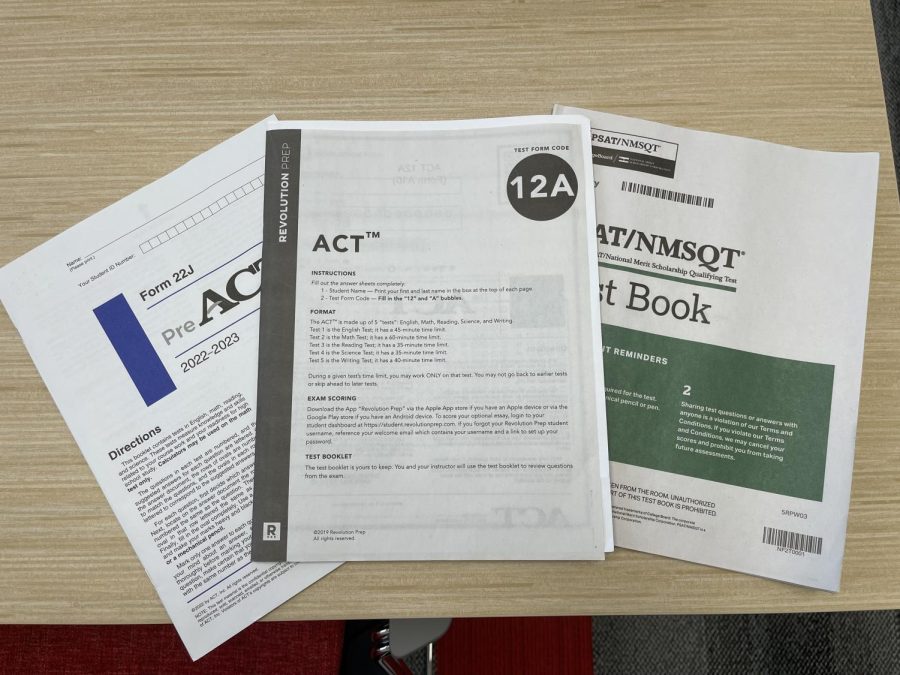How do Test Optional Colleges Impact Students?
Standardized test (ACT/SAT) practice booklets for students.
Standardized testing places a tremendous burden on students while applying for colleges. The option of whether or not to submit test scores to schools has become a recent opportunity due to the Covid-19 pandemic. This will be the third year for college applicants to go test-optional.
Many seniors this year chose to opt-out of tutoring for standardized tests. Many students didn’t feel the need to study for a test they weren’t planning to submit. Students and families saved a lot of money if they chose not to tutor for the ACT/SAT. “I saved a lot of money because I didn’t do any tutoring at all. I took the test once blindly then decided I wasn’t going to submit my ACT to any schools. I was a bit nervous when I decided to only take it once and not submit, but it ended up working out with a lot of my colleges,” senior Abby Lohmann said.
The ACT and SAT cause a large amount of added stress to students during their application process and college search. However, with test-optional schools, students’ stress levels have decreased tremendously. “The test itself is very stressful because there’s not much you can do. You can prepare as much as you can but once you get into the testing room there’s not much you can do. The only extremely stressful moment I had was one time I went to the wrong Testing Center and had to hurry to the other one,” senior Parker Thiede said.
Standardized tests, including the ACT and SAT, are not always an accurate representation of the ability and knowledge of a student as a whole. Many students suffer from learning disabilities which gives them a disadvantage during these tests. “I believe that some kids just struggle a lot with standardized testing, and it doesn’t necessarily reflect how smart they are as a student in the classroom. One student could do very poorly on the ACT or SAT but could get straight A’s in school,” senior Matthew Robinson said.
Many in the junior class believe that standardized tests are not an accurate representation of what you’re able to do in class. “It shows that in class, you’re actually paying attention. And it’s not like because some people are better at just like standard doing a test, but it shows that you actually pay attention in class and get all the assignments done,” junior Benjamin Watts said.
Along with the benefit of giving students the opportunity to choose whether or not they want to take the ACT/SAT, it can also be a downside because colleges can narrow down their student body based on the assumption of not submitting their tests. “That would be really good because then if you choose not to take the test then they’ll know [that] they probably didn’t do a good job on the ACT. So you know, it’ll just narrow it down. Kind of who you want on your campus,” junior Abyan Chaudhri said.
The junior class is in the progress of studying for the ACT, and some have already taken it. Studying for the ACT is an important part of junior year and preparing for college applications in the summer/next school year. “Well, I can’t exactly give you how many hours, but I’ve been doing it since August, but it’s been at least two or three times a week. It has been a big part of my life in order to get prepared to take the ACT,” Chaudhri said.
Now that the juniors are starting to study for the ACT, it is common that they’re planning on taking the standardized test multiple times before calling it quits. “I’ll probably take the ACT multiple times before submitting and if I don’t get the score I want, then I will either not submit or keep taking it until I do,” Watts said.
Although the test-optional aspect is a great idea, the downside is not being able to apply to possible dream schools if you have not achieved a high enough score or if you have not taken the ACT altogether. “If I don’t get a high enough score then I’ll just cut my losses and focus on applying to different schools that are test-optional,” Chaudhri said.

















































